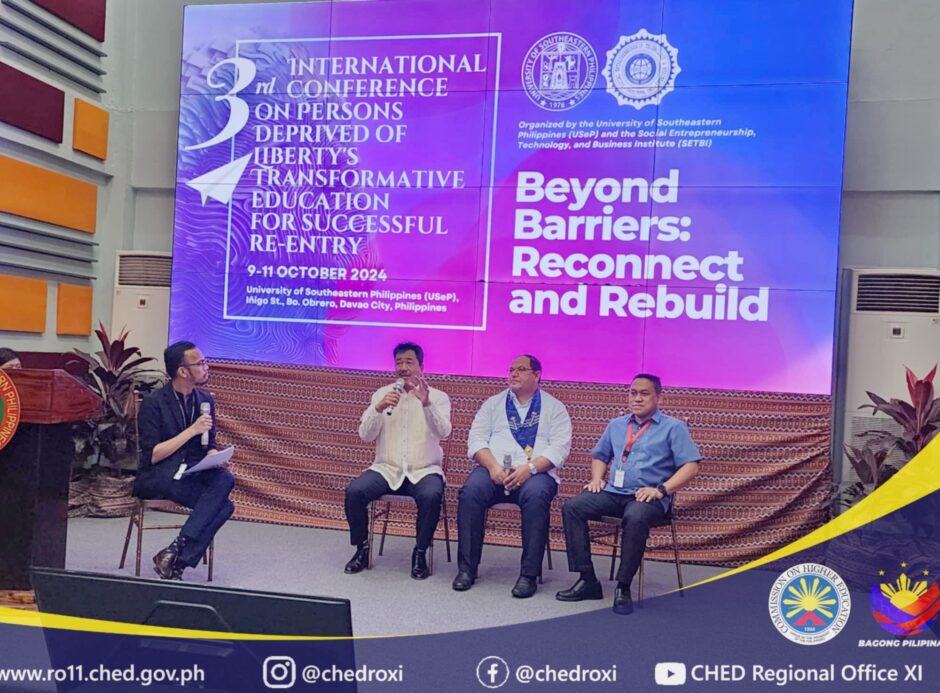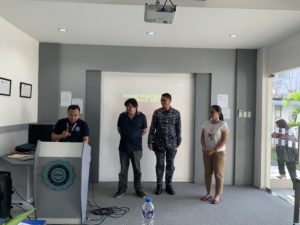
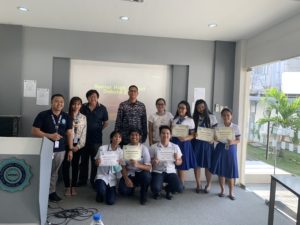
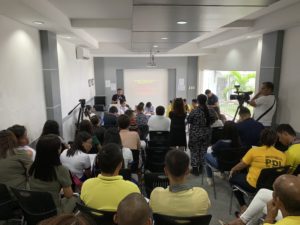 A debate team of six inmates from the senior high school at the College Education Behind Bars program in the Davao City Jail defeated a team of six Thompson Christian School senior high students. The debate took place on April 12, 2019, at the SETBI‘s College Education Behind Bars facility. The host debaters beat a Thompson Christian School team that had won first place for their debate skills. The Persons Deprived of Liberty (PDL)’s debating skills can help boost their confidence and change perceptions on both sides, people inside and people outside of the jail. The Social Entrepreneurship, Technology, & Business Institute (SETBI) organized the debate . A panel of three professionals judged the event while local media, guards, staff, fellow PDL students, and student mentors who had trained them. watched. As a formal process of exchanging ideas about a topic, debating can provide an excellent way to build self-confidence and express disagreement or anger in a socially acceptable way and even teach more civic values than one could have anticipated. Many of the PDLs know the consequences of poor thinking and bad choices. The debate guided PDL students to think clearly and rationally before responding. Most of us do not value the freedom we have, but Thompson Christian School students glimpsed into the life of the incarcerated, perhaps a deterrent for possible unwise future decisions.
A debate team of six inmates from the senior high school at the College Education Behind Bars program in the Davao City Jail defeated a team of six Thompson Christian School senior high students. The debate took place on April 12, 2019, at the SETBI‘s College Education Behind Bars facility. The host debaters beat a Thompson Christian School team that had won first place for their debate skills. The Persons Deprived of Liberty (PDL)’s debating skills can help boost their confidence and change perceptions on both sides, people inside and people outside of the jail. The Social Entrepreneurship, Technology, & Business Institute (SETBI) organized the debate . A panel of three professionals judged the event while local media, guards, staff, fellow PDL students, and student mentors who had trained them. watched. As a formal process of exchanging ideas about a topic, debating can provide an excellent way to build self-confidence and express disagreement or anger in a socially acceptable way and even teach more civic values than one could have anticipated. Many of the PDLs know the consequences of poor thinking and bad choices. The debate guided PDL students to think clearly and rationally before responding. Most of us do not value the freedom we have, but Thompson Christian School students glimpsed into the life of the incarcerated, perhaps a deterrent for possible unwise future decisions.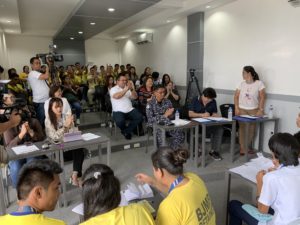
Actually for those who have never been inside the jail or prison, they should understand that all obstacles conjoin against the inmate students’ education. Education, however, is a great tool especially when paired with rehabilitation. This kind of debate program helps PDL students to discover their potential and to believe in themselves. One inmates said, “I don’t think I ever saw potential in myself, and this has given me the confidence that there is a potential in us and in me. There are other ways to make a living [besides selling drugs or using the drug]."
One of the Thompson students explained that the best part of the event was being able to speak with the inmates. The experience catapulted her into valuing her freedom, making good choices, determining which friends she would associate with, and deterring her from illegal activities. She admitted, “There is no other way I could have gotten the experience.” She was nervous only because she did not know what to expect. Entering a jail ushers a person into a whole different world with different rules, so that students remain cautious because they do not want to do something wrong unintentionally and come off as offensive. One acknowledged, “I was more afraid of how I would be conducting myself.” Both groups of students were nervous beforehand. Some of the PDL students were worried that they would not be as articulate or as prepared as the Thomson Christian School students. Working together during the visits to the College Education Behind Bars, the PDL students were able to bring a whole new perspective to the argument that TCS students could not have foreseen.
All the obstacles were against the PDL students’ success, because TCS students had a great deal at their disposal with access to information, such as the internet and libraries, and they had time to prepare more intensely. For the PDL students, however, the opportunity was a more personal experience. PDL students tried to demonstrate the aspects of the criminal justice system that their opponents had never considered. They had life perspectives. With these barriers, the debate gave the PDL students a sense of pride after completion.
It is important for the inmate students to have a sense of self-worth when they leave the jail and are trying to turn their life around. It gives PDL students a sense of confidence when they see they have prepared through their education while detained and that they will be able to do well on the outside. Further, the debate helped TCS students see PDLs as humans, as opposed to just a face in the crowd or a group of the invisible. Fortunately, TCS students realized that the PDL students are real people, and while the students’ paths may be different, their overall goals remain the same, because both have hope and dreams.
Academic study is not the only part of instruction at the College Education Behind Bars. There are also recovery programs where students can learn how to deal with their hurts, habits, and hang ups including but not exclusive to co-dependency, compulsive behavior, drug and alcohol addictions, and other issues. College Education Behind Bars has more than 100 inmates enrolled in classes now. The Social Entrepreneur Institute, the Bureau of Jail Management and Penology, Thompson Christian School, and the Department of Education in the Philippines (DepEd) initiated the Senior High Program at the College Education Behind Bars. Senior high students register at TCS, graduate from that K-12 institution, and get their diploma from TCS. Thompson sends its teachers to the SEI’s College Education Behind Bars facility to teach the inmate students. TCS also provides modules for SH students to follow. The inmate students enroll in Thompson, read the same school-assigned textbooks, and complete the equivalent SH level assignments as the “outside” SHS students. The only difference is that TCS teachers travel to the Davao City Jail, like USEP faculty in the college program, to teach courses there, instead of at the main high school campus.
